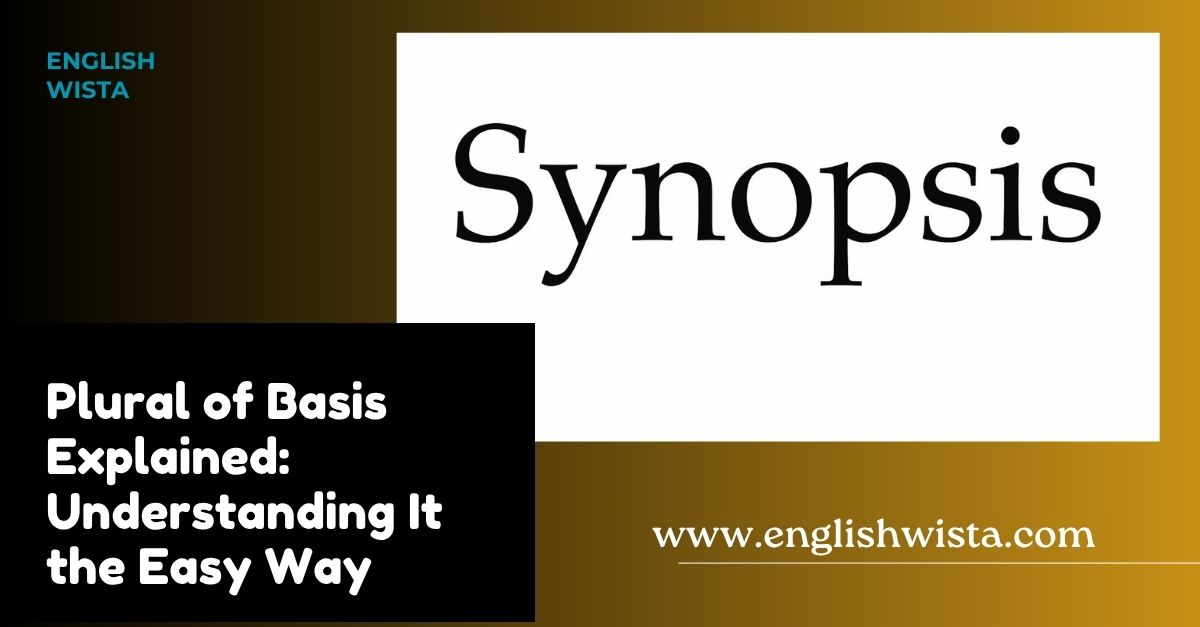Have you ever come across the word synopsis and wondered what its plural form is? Maybe you’ve seen it written as synopses somewhere and thought, “Wait, that doesn’t look right!” You’re not alone. English can be tricky when it borrows words from other languages especially Greek or Latin. The word synopsis is one of those fascinating cases that often confuses learners and even native speakers.
In this article, we’ll walk through everything you need to know about the plural of synopsis in a simple, friendly, and easy-to-follow way. You’ll learn what it means, how to use it correctly, and why its plural form looks a bit unusual. By the end, you’ll be confident using both synopsis and synopses in your writing and conversations.
So, grab a cup of tea (or coffee), and let’s dive right in!
What Does “Synopsis” Mean?
Before we talk about the plural, it’s important to understand what synopsis means.
A synopsis is a brief summary or overview of something usually a book, movie, research paper, play, or event. It gives you the main points without going into all the details. Think of it as the “big picture” version of a story or topic.
Here’s a quick example:
- Before watching the film, I read the synopsis to get an idea of the plot.
- The teacher asked us to write a short synopsis of the article.
So, in short, a synopsis helps people understand what something is about without needing to read or watch the entire thing.
What Is the Plural of Synopsis?
Now for the big question: What’s the plural form of “synopsis”?
The correct plural is synopses (pronounced si-NOP-seez).
Yes, it looks unusual and that’s because it doesn’t follow the regular English pattern of simply adding -s or -es to make plurals. Instead, it follows a pattern borrowed from Greek, where the word originally came from.
Let’s break it down:
- Singular: synopsis
- Plural: synopses
Simple enough, right? It’s just one of those words that keep a bit of their ancient Greek flavor!
Why Is the Plural “Synopses” and Not “Synopsises”?
That’s a smart question and a common one!
In English, most words form their plural by adding -s or -es (like cats, books, boxes). But synopsis is different because it comes from Greek, not from the typical English root.
The Greek word sýnopsis (σύνοψις) means “a seeing together” or “a general view.” When Greek words ending in -sis come into English, their plural often changes to -ses.
Here are a few similar examples to help you remember:
- Crisis → Crises
- Analysis → Analyses
- Thesis → Theses
- Diagnosis → Diagnoses
- Synopsis → Synopses
So whenever you see a word ending in -sis, there’s a good chance its plural will end in -ses.
How to Pronounce “Synopses” Correctly
Pronunciation can be another tricky part! The singular synopsis is pronounced /sɪˈnɒp.sɪs/ (si-NOP-sis).
The plural synopses is pronounced /sɪˈnɒp.siːz/ (si-NOP-seez).
Here’s an easy way to remember it:
- Synopses rhymes with theses.
So if you can say “theses,” you can say “synopses” just as easily!
Try saying both out loud:
- One synopsis.
- Two synopses.
Is “Synopsis” Singular or Plural?
The word synopsis is singular. It refers to just one summary.
For example:
- The student wrote a synopsis of the first chapter.
(Only one summary = singular.)
But if you’re talking about more than one summary, you use the plural synopses.
Example:
- The editor asked the writers to submit their synopses for review.
(More than one summary = plural.)
It’s that simple synopsis is singular, and synopses is plural.
Examples of “Synopsis” and “Synopses” in Sentences
Seeing a word used in context is one of the best ways to remember it. Let’s look at a few sentences for both forms.
Using “Synopsis” (Singular):
- Please write a one-page synopsis of your research proposal.
- The back cover of the book includes a short synopsis.
- She gave a brief synopsis of the project to the manager.
Using “Synopses” (Plural):
- The teacher reviewed all the students’ synopses before grading them.
- I read several movie synopses before deciding which one to watch.
- Publishers often require authors to submit multiple synopses for different audiences.
Did you notice how “synopses” sounds a bit more formal and academic? It’s often used in professional, literary, or academic settings but you’ll also see it in everyday English.
How to Remember the Plural Form Easily
If you keep forgetting that synopsis becomes synopses, here are a few memory tricks:
- Think of “analysis.”
- Analysis → Analyses
- Synopsis → Synopses
Both follow the same pattern.
- Focus on the ending “-sis.”
- If a word ends with -sis, it usually changes to -ses in the plural.
- Say it aloud.
The sound -sees at the end of synopses makes it easy to remember! - Visualize it.
Imagine a movie night where you read several synopses before picking a film. That mental image will help the spelling and usage stick.
Common Mistakes to Avoid
Many people get tripped up when writing or saying the plural of synopsis. Here are a few common errors and how to fix them:
❌ Synopsises This is incorrect.
✅ Synopses This is the correct plural form.
❌ Synopsis are interesting.
✅ Synopses are interesting. (Remember: plural = are)
❌ The teacher collected synopsis from the students.
✅ The teacher collected synopses from the students.
By watching out for these small details, your writing will sound much more natural and polished.
Where Do We Use the Word “Synopsis”?
You’ll see synopsis used in many different fields. Here are some examples:
- Books and literature:
Every novel submission must include a one-page synopsis. - Film and television:
Streaming platforms show short synopses for each movie or episode. - Academia:
Students often write synopses of research papers or articles. - Business and reports:
Executives read synopses to quickly understand proposals or plans.
Basically, any time you need a summary, you can use the word synopsis.
A Quick Etymology Lesson (Where It Came From)
If you love learning about word origins, this part’s for you!
The word synopsis comes from the Greek word σύνοψις (sýnopsis), which means “seeing together” or “a general view.”
It’s made up of two parts:
- syn- (together)
- opsis (seeing or view)
So, literally, synopsis means “seeing everything together.” That makes perfect sense, doesn’t it? A synopsis gives you the whole picture of something without showing every small detail.
Fun Facts About “Synopsis”
Here are a few fun and interesting tidbits to make the word even more memorable:
- Hollywood loves synopses!
Screenwriters and producers rely heavily on them. A great synopsis can determine whether a movie idea gets approved or not. - There’s a difference between a “synopsis” and a “summary.”
A synopsis is usually more structured and formal often used in professional settings. A summary can be casual and less detailed. - Some people pronounce “synopsis” differently around the world.
In American English, it’s si-NAHP-sis, while in British English, it might sound a bit softer: si-NOP-sis. Both are correct! - It’s part of a word family!
Other related words include synoptic (meaning “giving a general view”) and synoptically (an adverb form).
Synopses vs. Summaries: Are They the Same?
Many people use synopsis and summary interchangeably and that’s fine in casual conversation but there’s a slight difference in tone and purpose.
- A summary is a brief account of the main points of something. It can be informal and short.
- A synopsis is often a more organized and formal summary, especially used in literature, film, and academia.
For example:
- The teacher asked for a short summary of the chapter. (Informal)
- The publisher requested a detailed synopsis of the manuscript. (Formal)
So, while they’re similar, synopsis carries a more professional tone.
Synopses in Everyday Life
Even if you’re not a writer or filmmaker, you use synopses all the time probably without realizing it!
When you read the description of a show on Netflix, that’s a synopsis.
As you browse the back of a book in a bookstore, that’s another synopsis.
When your friend asks, “What’s that movie about?” and you give a short answer that’s you giving a synopsis!
So, see? You’re already using the word in your daily life it’s just about knowing how to spell and say it correctly.
Quick Recap: Key Takeaways
Let’s sum everything up in a few easy points:
- Singular: Synopsis
- Plural: Synopses
- Meaning: A brief summary or general overview of something.
- Origin: Greek, from “sýnopsis,” meaning “seeing together.”
- Pronunciation: si-NOP-sis (singular), si-NOP-seez (plural)
- Common Mistake: Don’t say synopsises that’s incorrect!
- Tip to Remember: Words ending in -sis usually change to -ses in plural form.
Conclusion: You’ve Got It!
And there you have it! The plural of synopsis is synopses a slightly tricky but elegant word that’s worth remembering.
Next time you’re writing about multiple book summaries or film overviews, you’ll know exactly which form to use. And if someone ever asks, “Is it synopsises or synopses?” you can smile confidently and explain it to them.
Remember: English is full of these interesting exceptions that make the language colorful and unique. Once you get used to patterns like -sis → -ses, words like analysis, thesis, and synopsis won’t confuse you anymore.
So go ahead use your new knowledge proudly, and maybe even share a few synopses of your favorite stories!



